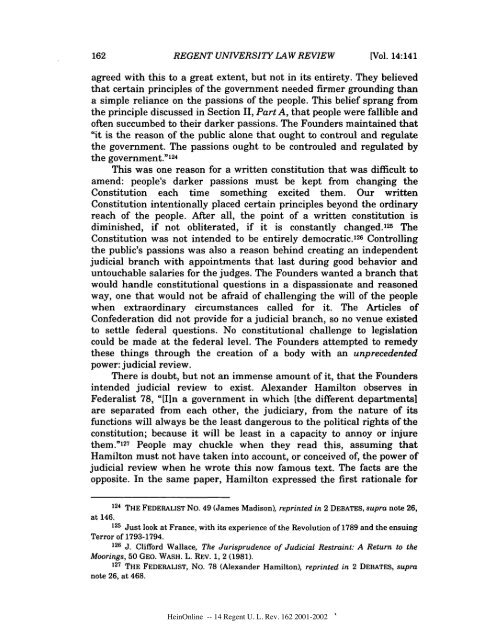Judicial ReEngineering
Judicial ReEngineering
Judicial ReEngineering
You also want an ePaper? Increase the reach of your titles
YUMPU automatically turns print PDFs into web optimized ePapers that Google loves.
REGENT UNIVERSITY LAW REVIEW<br />
[Vol. 14:141<br />
agreed with this to a great extent, but not in its entirety. They believed<br />
that certain principles of the government needed firmer grounding than<br />
a simple reliance on the passions of the people. This belief sprang from<br />
the principle discussed in Section II, Part A, that people were fallible and<br />
often succumbed to their darker passions. The Founders maintained that<br />
"it is the reason of the public alone that ought to controul and regulate<br />
the government. The passions ought to be controuled and regulated by<br />
the government." 124<br />
This was one reason for a written constitution that was difficult to<br />
amend: people's darker passions must be kept from changing the<br />
Constitution each time something excited them. Our written<br />
Constitution intentionally placed certain principles beyond the ordinary<br />
reach of the people. After all, the point of a written constitution is<br />
diminished, if not obliterated, if it is constantly changed. 125 The<br />
Constitution was not intended to be entirely democratic. 126 Controlling<br />
the public's passions was also a reason behind creating an independent<br />
judicial branch with appointments that last during good behavior and<br />
untouchable salaries for the judges. The Founders wanted a branch that<br />
would handle constitutional questions in a dispassionate and reasoned<br />
way, one that would not be afraid of challenging the will of the people<br />
when extraordinary circumstances called for it. The Articles of<br />
Confederation did not provide for a judicial branch, so no venue existed<br />
to settle federal questions. No constitutional challenge to legislation<br />
could be made at the federal level. The Founders attempted to remedy<br />
these things through the creation of a body with an unprecedented<br />
power: judicial review.<br />
There is doubt, but not an immense amount of it, that the Founders<br />
intended judicial review to exist. Alexander Hamilton observes in<br />
Federalist 78, "[ln a government in which [the different departmentsl<br />
are separated from each other, the judiciary, from the nature of its<br />
functions will always be the least dangerous to the political rights of the<br />
constitution; because it will be least in a capacity to annoy or injure<br />
them."'1 27 People may chuckle when they read this, assuming that<br />
Hamilton must not have taken into account, or conceived of, the power of<br />
judicial review when he wrote this now famous text. The facts are the<br />
opposite. In the same paper, Hamilton expressed the first rationale for<br />
124 THE FEDERALIST No. 49 (James Madison), reprinted in 2 DEBATES, supra note 26,<br />
at 146.<br />
125 Just look at France, with its experience of the Revolution of 1789 and the ensuing<br />
Terror of 1793-1794.<br />
126 J. Clifford Wallace, The Jurisprudence of <strong>Judicial</strong> Restraint: A Return to the<br />
Moorings, 50 GEO. WASH. L. REV. 1, 2 (1981).<br />
127 THE FEDERALIST, No. 78 (Alexander Hamilton), reprinted in 2 DEBATES, supra<br />
note 26, at 468.<br />
HeinOnline -- 14 Regent U. L. Rev. 162 2001-2002

















